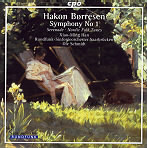Hakon Borresen (1876-1954) was an essentially conservative Danish composer who wrote music in traditional forms, employing a typically late-Romantic musical idiom that later took a turn toward the neo-classical. Both stylistic types are neatly illustrated on this engaging disc. The First Symphony, dating from 1901, is a passionate, surprisingly assured work, confidently scored and structured. The most remarkable thing about it is the slow finale, one of the very few pieces that clearly shows the influence of Tchaikovsky’s Sixth Symphony. Even more remarkable, Borreson’s own symphony hardly suffers from the comparison, being sufficiently individual in style and expression to take notice of, rather than be overwhelmed by, the great Russian composer’s musical influence. The fleet and attractive Serenade for Horn, Strings, and Timpani dates from 1944, and shows the composer working in his more disciplined, neo-classical vein. It makes a welcome addition to the horn repertoire; let’s hope some enterprising soloists take it up. Finally, the Nordic Folk Tunes for String Orchestra, though dating from the end of the composer’s career (1949), charmingly demonstrate that Romantic Nationalism never was far from his musical thoughts. The performances here all sound committed and expert. A real novelty.
































